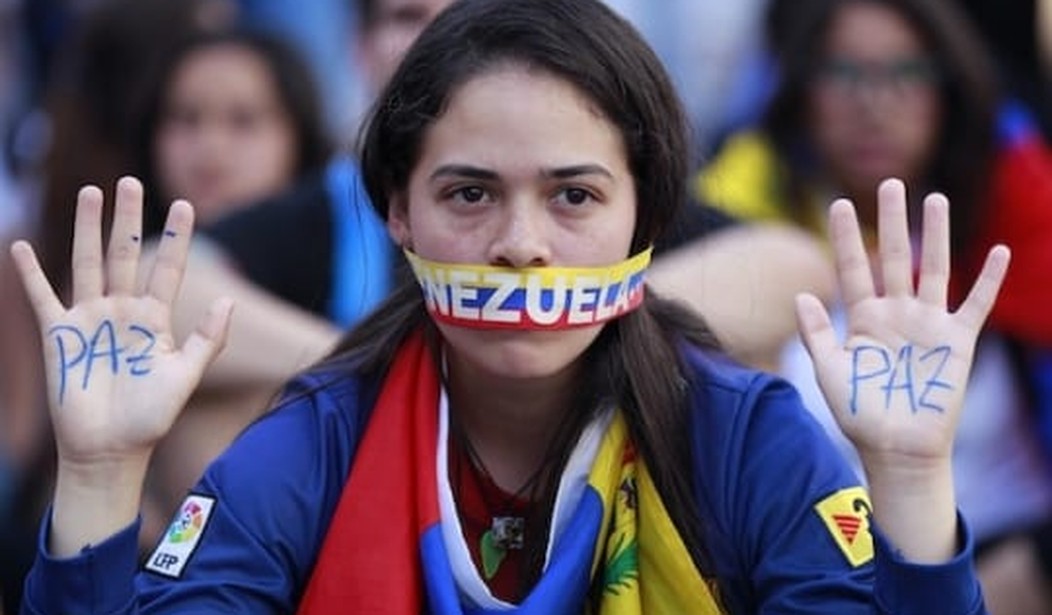WASHINGTON — Opponents to the Chavista rule of Nicolas Maduro poured out into the streets as the Euromaidan activists were demanding a future free from the Kremlin’s grip, creating a tug-o-war with the news cycle at different corners of the globe as both Venezuelans and Ukrainians demanded democracy and an economically viable future.
Now, both in the news cycle and in Washington, Venezuela is almost the forgotten revolution.
A quick scan of the headlines in El Universal shows that this ongoing quest hasn’t gotten any better in the South American nation, with Maduro’s government attacking more student demonstrators, going after more protest leaders, and even halting the flow of newsprint to El Universal, forcing the paper to dramatically cut its page count since mid-March.
Opposition leader and former Chacao mayor Leopoldo Lopez has been in Maduro’s custody since Feb. 18, while his wife Lilian Tintori continues leading peaceful protests despite harassment from the government. On an active Twitter account, Tintori vowed to stand “on the side of the truth” and on “the right side of history.”
White House press secretary Jay Carney last mentioned Venezuela in a news briefing on Feb. 25, when he was asked about Washington’s expulsion of three Venezuelan diplomats and the future of the oil trade relationship.
“I would simply say that President Maduro needs to focus on addressing the legitimate grievances of the Venezuelan people through meaningful dialogue with them, not through dialogue with the United States,” Carney said. “Despite what the Venezuelan government would like to lead people to believe, this is not a U.S.-Venezuela issue. It is an issue between Venezuela and its people. We’ve been clear all along that the future of Venezuela is for the Venezuelan people to decide.”
At the State Department last week, spokeswoman Jen Psaki was asked about Maduro’s latest demands of the Obama administration: that Washington better not think about applying sanctions because Caracas will retaliate, including hurting Venezuelans living in the U.S. by closing consulates, and that President Obama needs to accept the credentials of the new Venezuelan ambassador.
Psaki said the U.S. is “encouraged” by talks between Maduro’s government and the opposition, mediated in part by the Holy See, and “we encourage the parties to remain focused on strengthening Venezuela’s democracy, including the right to peaceful protests.”
A few hundred Venezuelans joined a “Trip for Freedom” caravan from Florida to Washington on Friday to lobby for sanctions on Capitol Hill, but Psaki said she hadn’t heard of the grass-roots effort. Photos from the protest in front of the White House show one man holding up a sign that reads, “In Venezuela we have a human rights violator as a president, your silence allows it.”
In remarks to the Council of the Americas conference last week, Secretary of State John Kerry said the U.S. “is deeply concerned by the deteriorating situation” in Venezuela.
“We believe the future of Venezuela is for the people of Venezuela to decide. And the people in the streets have legitimate grievances that deserve to be addressed. And the serious and worsening economic and social challenges in Venezuela can only be resolved with the input of those people,” Kerry said.
A few lawmakers with a long history of anti-Chavista activism are trying to put some tangible action behind the platitudes that trickle out of the administration now and then.
Before the House left for recess last week, the Foreign Affairs Committee passed a resolution from Rep. Ileana Ros-Lehtinen (R-Fla.) “to impose targeted sanctions on individuals responsible for carrying out or ordering human rights abuses against the citizens of Venezuela.”
At Friday’s markup hearing, Ros-Lehtinen also gave a nod to activists who caravanned to D.C., as well as actress Maria Conchita Alonso, who has compared the late Hugo Chavez to Hitler.
“For three months now, the Maduro regime in Venezuela has committed grave human rights violations as it seeks to muzzle students who are peaceful and the Venezuelan people who are calling for the respect of human rights and democracy to really take hold in this country,” the congresswoman said. “There have been over 40 people killed, nearly 60 reported cases of torture, more than 2,000 people unjustly detained, and hundreds more injured.”
Just that week, she noted, “250 teenage protesters, ones who had camped out in public squares to protest, were rounded up at 3 in the morning yesterday; the Venezuelan Intelligence agency, SEBIN, picked up and has put in detention Rodrigo Diamanti, the leader of a NGO called Un Mundo Sin Mordaza; censorship continues as yet another prominent independent radio program was pulled off the airwaves; newspapers like El Universal are saying they have about two weeks left of newsprint because the government has put many challenges in their way to provide information to the people of Venezuela.”
“And lastly, opposition leader Leopoldo Lopez was supposed to have his day in court yesterday and all of a sudden, his hearing was simply postponed without reason, without discussion, no explanation, simply canceled. All of this happened just this week.”
Ros-Lehtinen stressed that students are still bravely demonstrating and paying the price while congressional opponents of her resolution have said they won’t back sanctions so that the U.S. can “give peace a chance” in Union of South American Nations (UNASUR) talks.
“First – the violence is on the government’s side, not the students’!” Ros-Lehtinen said. “…I ask, when is it a good time? How many more people have to be innocently killed for the ‘time’ to be right? It will never be right – Maduro is the one perpetrating the violence.”
“It is not the U.S. that is derailing the peace process. Venezuelan leader Maduro and his goons are the ones derailing the process because they have the weapons and their allies, like the ‘colectivos’, are using them against the people, the unarmed, peaceful protesters.”
Sen. Marco Rubio (R-Fla.), who is leading a sanctions charge in the upper chamber, called out a State Department official for suggesting that Venezuelan opposition leaders are the ones who don’t want the U.S. government to impose sanctions on Maduro.
At a Thursday hearing of the Senate Foreign Relations Committee, Rubio asked Assistant Secretary of State Roberta Jacobson, “Who in the opposition in Venezuela has asked you not to impose sanctions against human rights violators because it might disrupt the dialogue?”
“Senator, I’m just not comfortable sitting here and giving you individual names,” Jacobsen replied, stating “members…who are participating in the dialogue, have discussed this with us” and adding that the timing needed to be right “when it comes to the response of a particular tactic on human rights violations, not our condemnation.”
Statements against Maduro are fine for now, she said, but not sanctions.
“So now, our message to the people of Venezuela, and to those who have suffered at the hands of these brutal oppressors, is, ‘I’m so sorry that you were sodomized by the butt of a rifle, but we think, for the sake of your country, that we’re going to hold off shaming the people and sanctioning the people responsible for ordering that, because we think there might be some sort of dialogue that may one day allow you to own one newspaper that is free in Venezuela.’ Or, ‘We think there might be a day when you might technically allow them to let you protest somewhere at a time of their choosing and of their way,'” Rubio said.
“We are calling on identifying human rights violators in Venezuela, naming them by name, and sanctioning them for what they’ve done,” added the senator, brandishing a list of 23 names ready for human-rights sanctions including governors, defense officials and prosectors orchestrating Maduro’s crackdowns. “And I just don’t understand how we can sit here and say that the time isn’t right to do that.”
The following day, Rubio hailed the Venezuelan opposition’s public support for such sanctions.
“Now that the main Venezuelan opposition group has made clear that is not the case and it, in fact, endorses individual sanctions like those in our legislation, this is a boost to our cause to hold the Maduro regime accountable by imposing sanctions,” he said.
“The time to stand with the Venezuelan people and against their repression by the regime is now. I hope the full Senate will soon be able to consider and approve sanctions legislation against Maduro regime officials and cronies.”
Foreign Relations Committee Chairman Robert Menendez (D-N.J.), who introduced the human-rights sanctions bill with Rubio and Sens. Bill Nelson (D-Fla.), John McCain (R-Ariz.) and Mark Kirk (R-Ill.) as co-sponsors, stressed that “we should be perfectly clear that the primary responsibility for the excessive, unjustified use of force rests with the Maduro administration.”
Menendez called a recent report from Human Rights Watch “far worse than I had anticipated.”
“The report documents how Venezuelan security forces – often in collaboration with colectivos – armed pro-government gangs – have systematically violated the rights of students, women, men, members of the political opposition, and journalists. They have severely beaten unarmed Venezuelans, fired live ammunition, rubber bullets, and tear gas canisters indiscriminately into crowds,” Menendez said.
“The report documents Venezuelan security forces subjecting detained protestors to severe physical abuse. I won’t go into great detail, but, in one case, members of the National Guard detained a young protester and – quoting from the report – ‘kicked him, beat him and fired a rubber pellet from point-blank range into his right thigh. [He] was driven to a military installation [where a] guardsman, who saw his bleeding leg, inserted his finger into the open wound, removed it, and then inserted it again,'” he continued.
“The report goes on to say that the guards handcuffed him to a metal pole, gave him electric shock treatments, kicked him, and called him a fascist.”









Join the conversation as a VIP Member